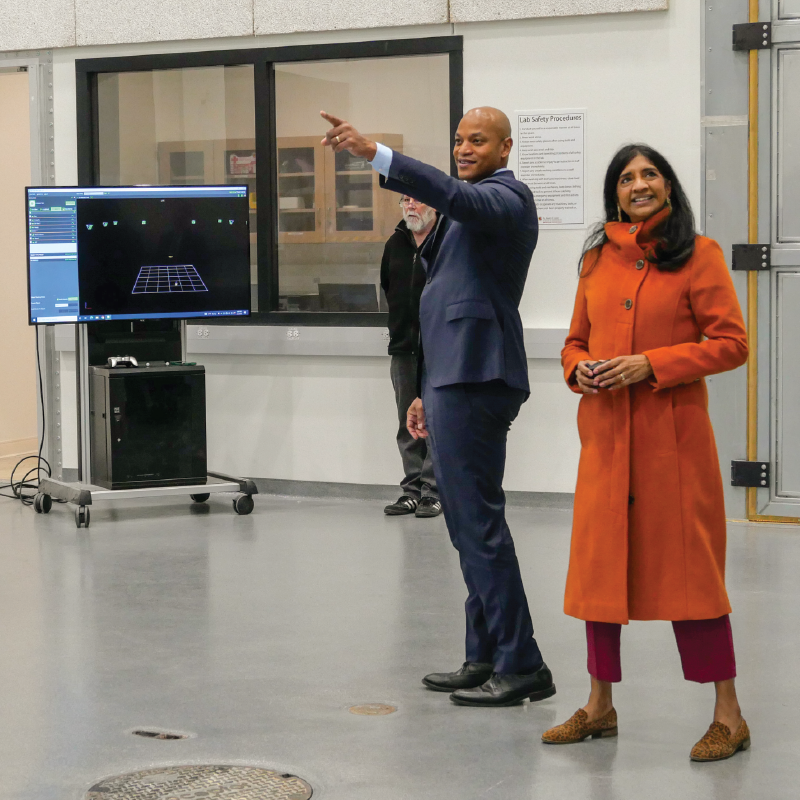News Story
Two ISR teams awarded NSF DDDAS grants
Two ISR-related teams have been awarded grants in the new National Science Foundation Dynamic Data Driven Applications Systems (DDDAS) program.
Professor Michael Ball (Robert H. Smith School of Business/ISR) is the principal investigator and Professor Michael Fu (BGMT/ISR) is the co-principal investigator for a three-year, $633,000 NSF award for "Dynamic Real-Time Order Promising and Fulfillment for Global Make-to-Order Supply Chains."
ISR Director Eyad Abed (ECE/ISR) and ISR-affiliated UMIACS Director V.S. Subrahmanian (CS/UMIACS) are co-principal investigators of a new three-year, $320,000 National Science Foundation award for "Data-Driven Power System Operations." The principal investigator is Assistant Professor Alan Sussman (CS/UMIACS). Dr. Priya Ranjan, an ISR research associate, is also participating in the project. This is a collaborative project involving another NSF grant with the same title to the University of Illinois.
Dynamic Real-Time Order Promising and Fulfillment for Global Make-to-Order Supply Chains
(Ball-Fu)
This research will study the business processes related to receiving, accepting, processing and fulfilling customer orders in global make-to-order supply chains. It will investigate databases and data flows underlying these processes, business decision processes and the manner in which they interact. Simulation and optimization models will be developed that monitor real-time streams of input data. Algorithms that monitor these streams must determine when predictions should change and should calculate such changes if appropriate.
Markov Decision Processes (MDPs) that dynamically adapt to sensor data streams also will be developed. The researchers also will consider the use of Mixed Integer Programming models for setting MDP parameters. The results will provide the basis for improved operational control of make-to-order supply chains and the theory underlying the development of "always on" controllers that continuously monitor supply chain data sources and project the future status of key business processes.
The research will support improved decision making under both normal operations and incident response. Normal operations decisions supported could include product positioning decisions, order timing and acceptance decisions and production scheduling decisions. Incident response mode will be used to develop a strategy for reacting to major disruptive events. Such events might include the failure or delay of a major supply shipment, a major breakdown in a factory or acceptance of a large order that preempts existing order commitments. These capabilities should substantially increase the level of customer service and the profitability for supply chains that employ them.
Data-Driven Power System Operations
(Sussman-Abed-Subrahmanian)
This research will develop new algorithms and tools for the distributed collection, sharing, mining and harnessing of data for cooperative health monitoring and vulnerability assessment of power systems in real time. Fundamental concepts and technology for achieving this objective exist today in the areas of power systems, system theory and computer science, but harnessing them to achieve this vision will require a significant multidisciplinary concerted effort.
The research will make fundamental contributions to the necessarily multidisciplinary systems required for data utilization in monitoring and control of interconnected engineering systems. The researchers will create new data-driven tools for electric power system operation and control. Applications systems include traditional SCADA systems as well as emerging Phasor Measurement Unit (PMU) data concentrators. The specific task areas are: distributed agent-based system monitoring; pattern recognition and change detection; dynamic analysis of signatures for early warning; data-driven, low-order modeling for security assessment; and automated visualization for power system health monitoring.
A broad impact is expected in several areas. The results in data manipulation, visualization, and processing will have application in any complex system that relies heavily on measurements for monitoring and control shares the same need to extract key information from massive amounts of data received over wide areas and time scales. Several of the investigators work very closely with the electric power industry through the Power Systems Engineering Research Center (PSERC), an NSF ERC.
About NSF's DDDAS program
Dynamic Data Driven Applications Systems (DDDAS) creates a rich set of new challenges for applications, algorithms, systems' software and measurement methods. It is a promising concept in which the computational and experimental measurement aspects of a computing application are dynamically integrated, creating new capabilities in a wide range of science and engineering application areas. Computational aspects of DDDAS may be realized on a diverse set of computer platforms including computational grids, leadership-class supercomputers, mid-range clusters, distributed, high-throughput computing environments, high-end workstations, and sensor networks. DDDAS requires strong, systematic collaborations between applications domain researchers and mathematics, statistics and computer sciences researchers, as well as researchers involved in the design and implementation of measurement methods and instruments.
DDDAS is a paradigm whereby application/simulations and measurements become a symbiotic feedback control system. DDDAS entails the ability to dynamically incorporate additional data into an executing application, and in reverse, the ability of an application to dynamically steer the measurement process. Such capabilities promise more accurate analysis and prediction, more precise controls, and more reliable outcomes. The ability of an application/simulation to control and guide the measurement process, and determine when, where and how it is best to gather additional data, has itself the potential of enabling more effective measurement methodologies. Furthermore, the incorporation of dynamic inputs into an executing application invokes new system modalities and helps create application software systems that can more accurately describe real-world complex systems. This enables the development of applications that adapt intelligently to evolving conditions, and that infer new knowledge in ways that are not predetermined by startup parameters. The need for such dynamic applications is already emerging in business, engineering and scientific processes, analysis, and design. Manufacturing process controls, resource management, weather and climate prediction, traffic management, systems engineering, civil engineering, geo-exploration, social and behavioral modeling, cognitive measurement and bio-sensing are examples of areas likely to benefit from DDDAS.
Published March 4, 2006









